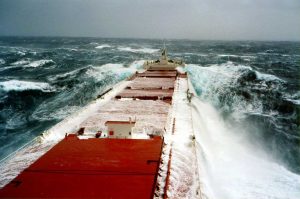
It seems that no other profession causes so much controversy as the job of a seafarer. There are those who can name good many reasons why one should never go to sea while others dream of such work. We are not going to take any side, but simply list some positive and negative aspects of a job at sea.
Pros:
High Salaries
Despite the fact that a top-ranked specialist is quite capable of earning good money onshore, it is obvious, if you compare average wages, that seafarers generally acquire greater income. You may have a glance at the vacancies for seafarers at our website to check the present rates. Meanwhile, in the offshore oil and gas industry salaries are even higher. So, if your goal is to save up for an apartment, car or cottage, etc. in a reasonable time, then consider work at sea.
Fast Career Development
If you start your nautical career early and plan it with care than you can be a Captain by 30. A few onshore professions can offer such spectacular career advancement.
Full Supply while at Sea

When the seafarer is onboard the shipowner covers all the expenses including flights, hotels, transfers, working overalls, food, etc. There is no usual daily spending that is inevitable when working onshore. This is especially convenient for those who are saving money.
An Opportunity to See the World and Travel
Modern vessels pop up in ports for the increasingly short period of time, but seafarers find an opportunity to explore remote and interesting locations which are not easily accessible to Everyman. There is also a category of seafarers who prefer not to return home at the end of their trip, but to spend a time in exotic countries. Maritime professionals can change their place of residence without any damage to their job or income.
Extended Vacation
Most seamen rest about 4-6 months during a year. No onshore profession can boast such a long break.
Benefit of Working in Multicultural Environment
Many seafarers work in mixed crews today. While onboard you will have a chance to try the cuisines of different nationalities, get acquainted with their cultural patterns and traditions. Moreover, job at sea is a great opportunity to improve your foreign languages skills.
Transition to a Well-paid Job Onshore
As a rule, maritime companies prefer candidates with a sound sea-going experience when looking for employees. They usually offer salaries that are comparable to seafarer’s or present an agreeable alternative.
Profession is Still in Demand
Maritime transport still tops the bill of the most cost-efficient ways of transporting cargo. According to shipbuilders’ booking orders merchant and offshore fleet will continue to expand, so seafarers will always be in demand. Meanwhile, BIMCO reports demonstrate constant shortage of officers all over the world.
Minuses:
Hard Physical Labor

On the other hand, when you look closer, work at sea is no bowl of cherries at all. Your working day sometimes exceeds 12 hours, there are no weekends and fatigue is aggravated by working within 6/6 hours shifts scheme. Constant change of time zones does help either. You might also be trapped in the heat of the tropics for all you trip or, vice versa, freeze in the northern latitudes. Do not forget about the constant rolling especially during the winter season.
Health Hazard
Job at sea is rather traumatic and may lead to serious health damage in case safety rules are not rigidly followed. Some types of vessels transport flammable and toxic cargoes, acids, etc. which obviously add to the risk of the profession. There is no doctor on most vessels as well so it is impossible to get a professional medical attention in time.
Separation from the Loved Ones
Despite the recent tendency to shorten the terms of the contracts, an average seafarer is cut off from his family for about 6-8 months a year. Fortunately, the problem has been alleviated slightly by the development of onboard Internet.
Pirates
Vessels often pass through dangerous zones there is a serious risk of a pirates attack. Firearms are prohibited on merchant vessels, so a crew finds itself virtually defenseless if attacked by pirates. At the best, the ship is ransacked; at the worst, pirates kidnap the crew and hold them captive for months waiting for a ransom to be paid.
Staying in a Confined Space
The working life and free time of seafarers is spent within the boundaries of a vessel. It is fortunate if the vessel is designed according to the latest requirements to onboard wellbeing i.e. there are large comfortable rooms and common areas. Meanwhile, there are still many vessels with small cabins, shared toilets and showers; vessels with no additional amenities such as saunas, gyms or swimming pool.
Not only secluded space affects a psyche during a long stay onboard, but a close proximity to same people month after a month takes its toll on a mental health on seafarers. However, this problem is not so acute for seafarers going on short trips.
The High Training Cost and Regular Certificates’ Revalidation
One of the maritime profession’s disadvantages is the need to conduct regular retraining and revalidation of nautical certificates. This doesn’t only take time from a well-owned break, but also costs a great deal of money. Some shipping companies, however, cover expenses for the training as a bonus for work.
No State Pension
In many countries seafarers don’t contribute to the state pension system and often do not pay any taxes at all. Therefore, it is prudent to take care about comfortable life in retirement yourself.

